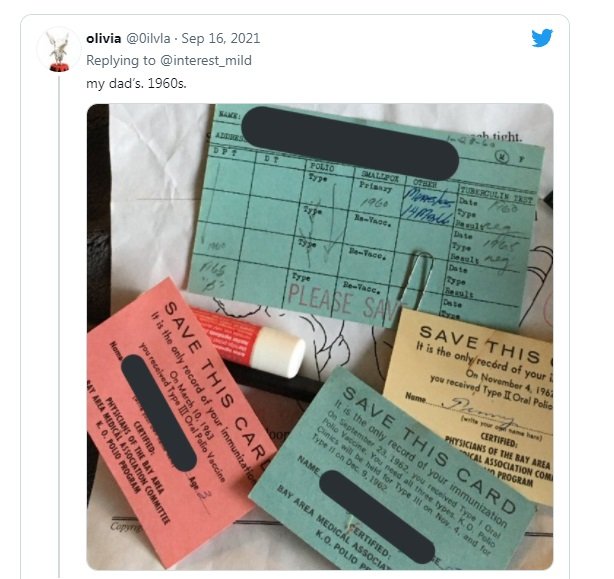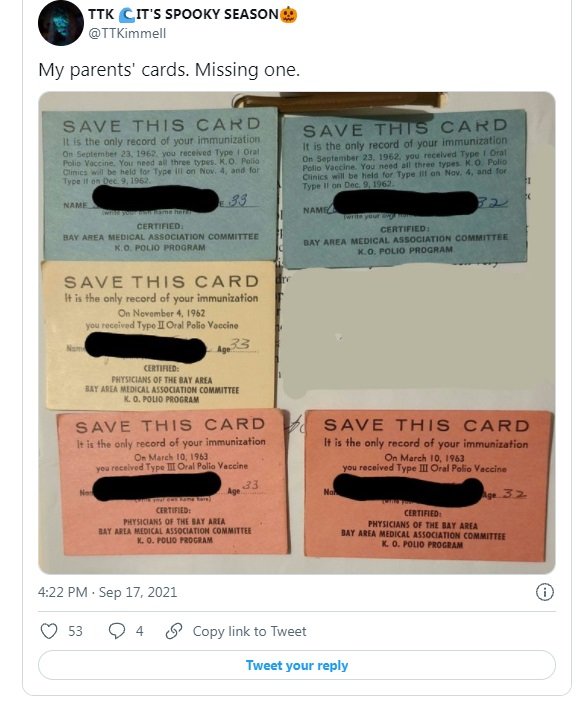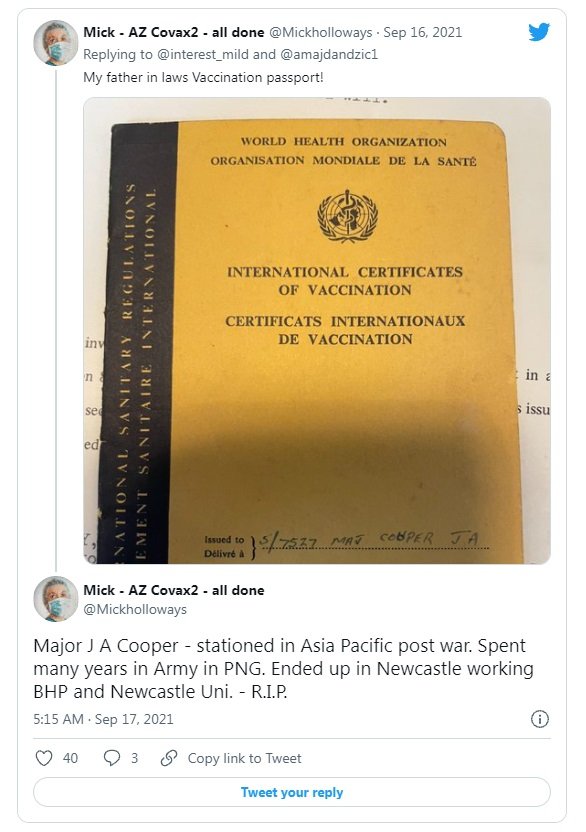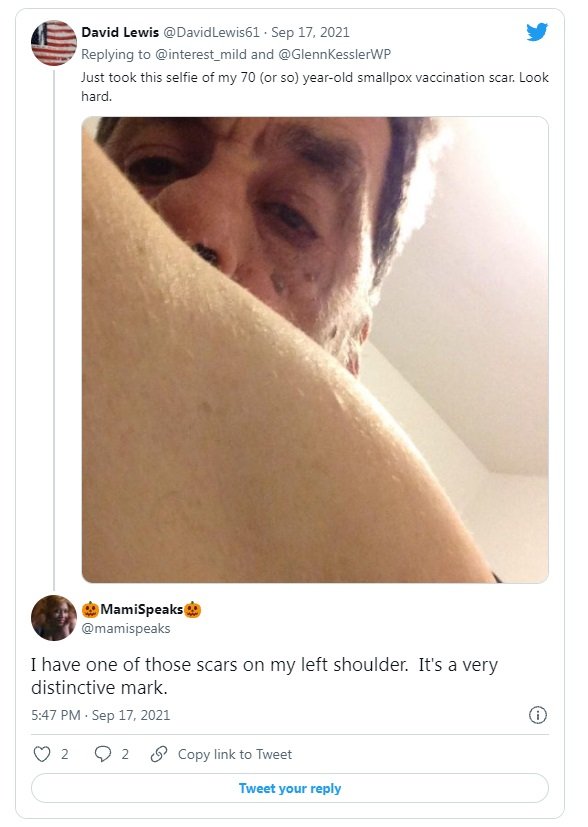A nice reminder that we have a history of doing the right thing for our nation's health.
Vaccines are without a doubt one of the most impactful scientific advancements in human history. Through vaccines, we eliminated smallpox, have nearly eliminated polio worldwide, and have saved countless lives through protection from a host of other infectious diseases. Yet even with that history, millions of Americans are refusing the coronavirus vaccines and decrying efforts to mandate proof of vaccination to partake in certain activities.
A Twitter post is serving as a timely reminder that vaccination isn't new and neither are proof-of-immunization requirements. The post shows a polio record card from 1956 that the poster found at the thrift store where they work. And the real kicker here is that COVID is actually far deadlier than polio ever was.
COVID-19 has killed nearly 670,000 Americans in the past year and a half. We are just days away from surpassing the death toll from the 1918 Spanish flu pandemic. Those numbers are staggering in comparison with the polio epidemic, which at its peak in 1952, killed 3,000 Americans in one year. Thousands more were paralyzed, but nowhere near hundreds of thousands in the span of a year.
I'm not trying to downplay polio—it's a terrible disease. It was especially scary because primarily impacted children, but by every other measure, the COVID pandemic is far worse than the polio epidemic ever was. In deaths, there's no comparison. In long-term effects, we simply don't know yet. COVID isn't leaving people paralyzed like polio did, but "long COVID" is a thing and organ damage caused by COVID can lead to a host of ongoing health problems.
People downplay COVID by saying most people who get the virus don't get severely sick, but the same is true of polio. According to the European Centre for Disease Prevention and Control, around 70% of polio cases are totally asymptomic, and another 25% have just mild symptoms. Less than 1% of cases result in paralysis, and far fewer result in death.
And yet, we never hear people say, "We should just take our chances with polio, since most people who get it are fine!" We still vaccinate for it, even though the chances of getting it in the U.S. is practically nil at this point because vaccination has eradicated it.
Some people don't trust the coronavirus vaccines because they think they were approved for use too quickly. But do you know how long it was between the start of clinical trials for the polio vaccine to when it was approved? Less than a year. Clinical trials for the Salk polio vaccine began on 1.8 million children (650,000 of whom got the vaccine, with 1.2 million getting a placebo) on April 26, 1954 and the vaccine was approved April 12, 1955. It wasn't without controversy, of course, but the success of the vaccine speaks for itself.
That was nearly seven decades ago. Think of how far medical research has come since then and how much greater our understanding of infectious disease and immunology is now. We already had enormous amounts of base knowledge about coronaviruses in general, decades of mRNA research under our belt, and more than a decade of mRNA vaccine development already underway, so the quickly developed and tested COVID vaccines are not terribly surprising.
As for proof of vaccination complaints, the polio card post also prompted a flood of other photos of immunization "passports," from record books to reminders that people with smallpox inoculations had to literally show the scar on their arm to prove that they'd been vaccinated.


The military has been required to get vaccines for pretty much ever.

And yes, people with smallpox vaccinations used to have to lift their shirt sleeves to show that they'd been immunized before being allowed to enter some public places.

Sometimes a "vaccine passport" is literally called a vaccine passport. And many jobs have long required them.
One of the unfortunate side effects of living in the information age is that we spend so much time battling misinformation. I recall predictions from disease specialists in March 2020 that we may lose 100,000 to 200,000 Americans to COVID-19, and people scoffing about fearmongering. Here we are 18 months and 680,000 deaths later, still having to convince people that COVID is real, the pandemic is serious, vaccination is good, and requiring proof of immunization for life-threatening infectious disease is not an authoritarian power-grab.
If you're immunized for polio, which you most probably are, being immunized for coronavirus should be a no brainer. The risk of COVID is much higher, the vaccines have had ample time for testing in comparison to the early days of polio immunization, and the vaccines have been proven safe and effective according to the vast majority of people who are qualified to evaluate such things.
We're all tired of this stupid pandemic. Please do your part and get vaccinated if you are able.
Vaccines are without a doubt one of the most impactful scientific advancements in human history. Through vaccines, we eliminated smallpox, have nearly eliminated polio worldwide, and have saved countless lives through protection from a host of other infectious diseases. Yet even with that history, millions of Americans are refusing the coronavirus vaccines and decrying efforts to mandate proof of vaccination to partake in certain activities.
A Twitter post is serving as a timely reminder that vaccination isn't new and neither are proof-of-immunization requirements. The post shows a polio record card from 1956 that the poster found at the thrift store where they work. And the real kicker here is that COVID is actually far deadlier than polio ever was.
I'm not trying to downplay polio—it's a terrible disease. It was especially scary because primarily impacted children, but by every other measure, the COVID pandemic is far worse than the polio epidemic ever was. In deaths, there's no comparison. In long-term effects, we simply don't know yet. COVID isn't leaving people paralyzed like polio did, but "long COVID" is a thing and organ damage caused by COVID can lead to a host of ongoing health problems.
People downplay COVID by saying most people who get the virus don't get severely sick, but the same is true of polio. According to the European Centre for Disease Prevention and Control, around 70% of polio cases are totally asymptomic, and another 25% have just mild symptoms. Less than 1% of cases result in paralysis, and far fewer result in death.
And yet, we never hear people say, "We should just take our chances with polio, since most people who get it are fine!" We still vaccinate for it, even though the chances of getting it in the U.S. is practically nil at this point because vaccination has eradicated it.
Some people don't trust the coronavirus vaccines because they think they were approved for use too quickly. But do you know how long it was between the start of clinical trials for the polio vaccine to when it was approved? Less than a year. Clinical trials for the Salk polio vaccine began on 1.8 million children (650,000 of whom got the vaccine, with 1.2 million getting a placebo) on April 26, 1954 and the vaccine was approved April 12, 1955. It wasn't without controversy, of course, but the success of the vaccine speaks for itself.
That was nearly seven decades ago. Think of how far medical research has come since then and how much greater our understanding of infectious disease and immunology is now. We already had enormous amounts of base knowledge about coronaviruses in general, decades of mRNA research under our belt, and more than a decade of mRNA vaccine development already underway, so the quickly developed and tested COVID vaccines are not terribly surprising.
As for proof of vaccination complaints, the polio card post also prompted a flood of other photos of immunization "passports," from record books to reminders that people with smallpox inoculations had to literally show the scar on their arm to prove that they'd been vaccinated.


The military has been required to get vaccines for pretty much ever.

And yes, people with smallpox vaccinations used to have to lift their shirt sleeves to show that they'd been immunized before being allowed to enter some public places.

Sometimes a "vaccine passport" is literally called a vaccine passport. And many jobs have long required them.
One of the unfortunate side effects of living in the information age is that we spend so much time battling misinformation. I recall predictions from disease specialists in March 2020 that we may lose 100,000 to 200,000 Americans to COVID-19, and people scoffing about fearmongering. Here we are 18 months and 680,000 deaths later, still having to convince people that COVID is real, the pandemic is serious, vaccination is good, and requiring proof of immunization for life-threatening infectious disease is not an authoritarian power-grab.
If you're immunized for polio, which you most probably are, being immunized for coronavirus should be a no brainer. The risk of COVID is much higher, the vaccines have had ample time for testing in comparison to the early days of polio immunization, and the vaccines have been proven safe and effective according to the vast majority of people who are qualified to evaluate such things.
We're all tired of this stupid pandemic. Please do your part and get vaccinated if you are able.



